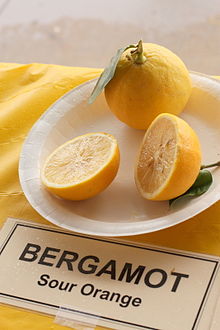| Bergamot orange | |
|---|---|

| |
| Scientific classification | |
| Kingdom: | Plantae |
| Clade: | Tracheophytes |
| Clade: | Angiosperms |
| Clade: | Eudicots |
| Clade: | Rosids |
| Order: | Sapindales |
| Family: | Rutaceae |
| Genus: | Citrus |
| Species: | C. bergamia
|
| Binomial name | |
| Citrus bergamia | |
| Synonyms[2] | |
| |
Citrus bergamia, the bergamot orange (pronounced /ˈbɜːrɡəmɒt/), is a fragrant citrus fruit the size of an orange, with a yellow or green colour similar to a lime, depending on ripeness.
Genetic research into the ancestral origins of extant citrus cultivars found bergamot orange to be a probable hybrid of lemon (itself a hybrid between bitter orange and citron[3][4]) and bitter orange.[5] Extracts have been used as an aromatic ingredient in food, tea, snus, perfumes, and cosmetics.[6][7] Use on the skin can increase photosensitivity, resulting in greater damage from sun exposure.[6]
- ^ The International Plant Names Index, retrieved 2 June 2015
- ^ Porcher, Michel H.; et al. (1995), Multilingual Multiscript Plant Name Database (M.M.P.N.D): Sorting Citrus Names, The University of Melbourne
- ^ Gulsen, O.; M. L. Roose (2001). "Lemons: Diversity and Relationships with Selected Citrus Genotypes as Measured with Nuclear Genome Markers". Journal of the American Society for Horticultural Science. 126 (3): 309–317. doi:10.21273/JASHS.126.3.309.
- ^ Genetic origin of cultivated citrus determined: Researchers find evidence of origins of orange, lime, lemon, grapefruit, other citrus species" Archived September 21, 2017, at the Wayback Machine, Science Daily, January 26, 2011 (Retrieved February 10, 2017).
- ^ Curk, Franck; Ollitrault, Frédérique; Garcia-Lor, Andres; Luro, François; Navarro, Luis; Ollitrault, Patrick (2016). "Phylogenetic origin of limes and lemons revealed by cytoplasmic and nuclear markers". Annals of Botany. 117 (4): 565–583. doi:10.1093/aob/mcw005. PMC 4817432. PMID 26944784.
- ^ a b "Bergamot oil". Drugs.com. 21 September 2021. Retrieved 4 February 2022.
- ^ Davidson, Alan (2006). Jaine, Tom (ed.). The Oxford Companion to Food (Second ed.). OUP Oxford. p. 75. ISBN 0-19-280681-5.
The bergamot orange is not edible and is grown only for its fragrant oil, although its peel is sometimes candied.